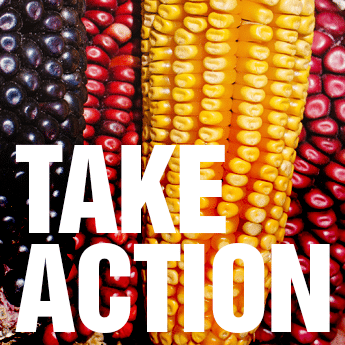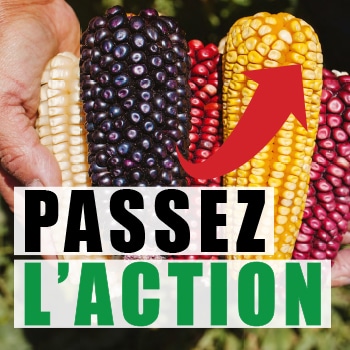Canada and US challenge Mexico’s ban on GM corn
Updated January 2024
New! Click here for the full update and analysis, January 29, 2024.
“La contaminación con maíz transgénico no es un accidente, su defensa tampoco!”
“Contamination with GM maize is no accident, neither is our defence!”
– Network for the Defense of Maize (La Red en Defensa del Maíz), Mexico, 2015
“We have to take care of health and also protect the native varieties of corn.”
– Andrés Manuel López Obrador, President of Mexico, February 2023
“We are a sovereign nation with a democratic government.”
– Victor Suarez, Mexico’s Undersecretary of Agriculture for Food and Competitiveness, 2021
“We show the maize contamination strategy used by transnational companies and governments, who seek to introduce GM maize into our lives in any way and at any price.”
– Network for the Defense of Maize (La Red en Defensa del Maíz), Mexico, 2015
“The hope of the industry is that over time the market is so flooded [with genetically modified organisms] that there’s nothing you can do about it. You just sort of surrender.”
– Don Westfall, Vice-President, Promar International, Toronto Star, January 9, 2001
“The planting of transgenic maize in Mexico is a historic crime against the peoples of maize, against biodiversity and food sovereignty, against ten thousand years of indigenous and peasant agriculture that bequeathed this seed for the wellbeing of all the peoples of the world.”
– From the Manifesto in Defense of Maize, October 2009
Update
On June 9, 2023, the Government of Canada announced that it will join the United States in challenging the Government of Mexico’s ban on genetically engineered (genetically modified or GM) corn (often referred to in Spanish as “transgenic”). Canada will join as a third Party to the US government’s trade dispute with Mexico under the Canada-US-Mexico Agreement (CUSMA) [Dispute MX-USA-2023-31-01].
January 9, 2024: At the request of the United States and Canadian governments, a trade dispute panel has rescinded an invitation to Canadian non-governmental organizations (NGOs) to submit official comments in the dispute under the Canada-US-Mexico Trade Agreement (CUSMA) over Mexico’s phase-out of genetically engineered (genetically modified or GM) corn. Read CBAN’s press release.
The Importance of Corn in Mexico
“Contamination isn’t just one more problem. It’s an aggression against Mexico’s identity and its original inhabitants…We want our seeds and we are going to defend them and rescue them.” – Alvaro Salgado of the Center for Indigenous Missions (CENAMI), Mexico, 2004
Mexico is the birthplace of corn and is home to more varieties than anywhere else on earth. Mexican farmers have safeguarded native corn biodiversity by keeping thousands of traditional landraces under cultivation. This diversity is the genetic pool that corn breeders rely on and it is foundational to Mexican culture and to Indigenous cultures in particular.
“For indigenous people, maize is first, maize is ours, and we are part of her…Maize is very sacred to us, it is our life.” – Eutimio Díaz, of the Wixarika people in Jalisco, 2010
GM contamination in the global centre of corn’s origin would be a serious threat to biodiversity and food security in Mexico and around the world. Despite a ban on growing GM corn in Mexico, contamination was found in 2001 (see pages 18-19 of CBAN’s report on contamination). Mexican farmers worked hard to remove this GM contamination. To prevent future contamination, indigenous and farming communities formed the Network in Defense of Maize (La Red en Defensa del Maíz) in 2001. Indigenous and farming communities in Mexico have been calling for a ban on GM corn imports since 2003.
“Our Creation Story teaches us that the first Grandparents of our people were made from white and yellow corn. Maize is sacred to us because it connects us with our ancestors. It feeds our spirit as well as our bodies.” – Juana Batz Puac, K’iche’ Maya (Day Keeper) from Creation story of the Maya people via Smithsonian National Museum of the American Indian
Corn is a staple food in Mexico. On average, Mexicans eat one pound of corn a day, one of the highest consumption levels in the world. Unlike corn consumption in Canada and the US which is dominated by processed corn ingredients and animal feed, in Mexico corn is commonly consumed directly, largely through the use of minimally processed white corn flour for tortilla. Mexico is self-sufficient in white corn production.
“Mexico is the center of origin of more than 55 corn breeds. The Mexican government’s food security policy consists of preserving this biocultural heritage. It also promotes the preservation of the agroecological practices of our peasant communities, the milpa and the richness of our gastronomy.” – Government of Mexico, Decree of action on glyphosate and GM corn, February 13, 2023 (translated)
The native peoples of Mexico created maize and they have been the guardians and creators of the diversity of varieties currently in existence. Food sovereignty and the preservation of this diversity depend on the integrity of their rights. Because of that, transgenic contamination is an assault on the identity of Mesoamerican peoples and is an act of aggression against ten thousand years of agriculture. The planting of transgenic maize is a frontal attack against native and peasant peoples and a violation of their rights.
For the peoples that constitute Mexico, maize is not a commodity, but the origin of a civilization and the foundation of the livelihood of peasant lives and economies. We will not let our seeds be lost or contaminated by transgenes owned by transnational companies. We will not comply with unfair laws that criminalize seeds and peasant lifestyle. We will continue protecting maize and the life of our peoples.
– From the Manifesto in Defense of Maize, October 2009
Mexico’s decree to ban GM corn and glyphosate
Since 1998, Mexico has implemented a ban on growing GM corn. This ban was upheld by a Supreme Court ruling in 2013.
In December 2020, the President of Mexico signed a decree to phase out imports of GM corn (maize) and phase out the use of glyphosate-based herbicides, by 2024. The government stated that it will revoke and refrain from permitting the growing of GM corn (release of GM corn seed into the environment) and the use of corn for human food (specifically, the white corn flour and tortilla markets), and work towards the replacement of GM (yellow) corn imports for animal feed and industrial use for human food. However, following pressure from the US government and biotechnology companies, on February 13, 2023, the Government of Mexico replaced its 2020 decree with a new decree that removed a deadline for banning the use of GM (yellow) corn for animal feed and industrial uses but maintained a firm and immediate ban on the use of GM white corn, which is the type of corn used in tortillas for human consumption. It maintains the phase-out for glyphosate by 2024.
“This is consistent with the country’s food self-sufficiency policies…The main purpose of these measures is to protect the right to health and a healthy environment, native corn, cornfields, biocultural wealth, peasant communities and gastronomic heritage, as well as to guarantee nutritious, sufficient and quality food.” – Government of Mexico, 2020 decree (translated)
Canada and the US challenge Mexico
“…this is not a situation that lends itself to compromise. And the reason it doesn’t is, from our perspective, you’re talking about a fundamental principle to our trade, our understanding of trade, which is that you need a science-based, rules-based system.” – Tom Vilsack, United States Agriculture Secretary, March 2023
The Government of the United States alleges that Mexico’s measures to ban the use of white corn for food, to revoke existing GM corn authorizations and refrain from future authorizations, and to phase out of the use of GM corn in animal feed and industrially processed food are inconsistent with obligations under CUSMA’s Chapter 9 Sanitary and Phytosanitary (SPS) Measures on health and safety regulations, and Chapter 2 National Treatment and Market Access for Goods. (The complaint does not mention Mexico’s phase-out of glyphosate by 2024.)
However, CUSMA’s section on agricultural biotechnology explicitly states that countries are not required to authorize GMOs: “This Section does not require a Party to mandate an authorization for a product of agricultural biotechnology to be on the market.” (Article 3.14.2)
Canada does not export any corn to Mexico but the Government of Canada says it is challenging the Mexican government’s decree because Canada is concerned that Mexico will reject future genetically engineered crops and that this could also stop some companies from selling those same GM crops in Canada: “Canada is a major producer and exporter of agricultural products, including those that are products of biotechnology, to the United States and Mexico. When a key trading partner such as Mexico does not authorize biotechnology applications for Canadian agricultural exports, this creates an asymmetry in North American regulatory conditions that can lead to trade disruptions. Product developers also tend to refrain from commercializing innovative agricultural tools until they receive approvals in all major markets. Thus, the approach taken by Mexico in its decisions to reject biotechnology product applications may have a significant economic impact on Canadian producers, developers of innovative agricultural technologies, as well as consequences for trade flows into and out of Canada.” – Government of Canada, Notice of intention to join the consultations as a third Party – Mexican measures concerning genetically engineered products, June 9, 2023
“Canada will continue to work with Mexico and the U.S. towards an outcome that preserves trade predictability and market access for our farmers and exporters.”
All of the GM crops currently cultivated in Canada, and the vast majority grown in the US, are herbicide-tolerant. This means that they are twinned with the use of certain herbicides. Most are tolerant to glyphosate-based herbicides, and many are tolerant to more than one herbicide. Herbicide sales in Canada have increased by 234% since GM crops have been introduced (1994-2020). The COSEWIC (Committee on the Status of Endangered Wildlife in Canada) assessment and status report on the Monarch butterfly concluded that the critical decline in Monarch habitat in North America is “strongly correlated” with the use of herbicide-tolerant crops.
Science-based decision making
“Canada shares the concerns of the U.S. that Mexico’s measures are not scientifically supported and have the potential to unnecessarily disrupt trade in the North American market.” – Ministers Bibeau and Ng Statement on Mexican measures that impact Agricultural Innovation, June 9, 2023
Section 4 of CUSMA’s SPS chapter grants Mexico the right to establish its own standards for public health protection: “This Chapter does not prevent a Party from: (a) establishing the level of protection it determines to be appropriate; (b) establishing or maintaining an approval procedure that requires a risk assessment to be conducted before the Party grants a product access to its market; or (c) adopting or maintaining a sanitary or phytosanitary measure on a provisional basis if relevant scientific evidence is insufficient.”
On March 29, 2023, the Mexican government laid out the science behind its decision in a virtual conference organized by CONACYT, the government’s highest science body, and it held five weeks of public forums. The message from scientific experts was that there are documented health risks from exposure to glyphosate and there is sufficient evidence of the potential health risks associated with consuming large quantities of minimally processed GM corn, which may also contain glyphosate residues.
The Government of Mexico also hosts a database of citations of studies on the risks of glyphosate and GM corn, including those relating to GM corn contamination, insects developing resistance to GM insect-resistant corn, the impacts of GM corn on non-target insects in aquatic environments as well as the impacts on the monarch butterfly, the impacts on animals fed GM corn, and negative human health effects of glyphosate.
Corn Exports to Mexico
“The Decree prohibits the use of genetically modified corn for dough and tortillas. This does not affect trade or imports, among other reasons, because Mexico is more than self-sufficient in the production of GMO-free white corn. It is a matter of consolidating such sovereignty and food security in a central input in the culture of Mexicans.”
– Government of Mexico, February 13, 2023 (translation)
Mexico is the second largest importer of yellow corn in the world (China is the first). Mexico imports about 30% of its corn each year, most from the United States, and almost all of that is yellow corn for animal feed and industrial uses. (74% of Mexico’s yellow corn is imported.) Around 25% of corn grown in the US is exported to Mexico. The US Department of Agriculture reports that around 92% of corn grown in the US is genetically modified.
Canada does not export any corn to Mexico.
Mexico is self-sufficient in white corn product, and its domestic production of white corn is non-GM. Only 4% of U.S. corn exports are white corn, and most of that does not go into tortillas. White corn constituted only 3 percent of Mexican corn imports in 2021 and 2022. It accounts for just about one percent of American corn.
Under the North American Free Trade Agreement (NAFTA), corn exports from the US to Mexico increased by 400%. Imports of cheap corn from the US has driven down prices for Mexican farmers. “Our rationale is based on the precautionary principle in the face of environmental risks as well as the right of the Mexican government to take action in favor of the public good, in important areas such as public health and the environment. We are a sovereign nation with a democratic government, which came to power with the support of the majority of citizens, one that places compliance with our constitution and respect for human rights above all private interests.” – Victor Suarez, Undersecretary of Agriculture for Food and Competitiveness, Government of Mexico, 2021
For more information:
Canada and the U.S. are using free trade rules to attack Mexican food sovereignty, Canadian Centre for Policy Alternatives, June 22, 2023
Understanding the Agricultural Biotechnology Provisions in the U.S.-Mexico-Canada Agreement, Institute for Agriculture & Trade Policy, March 2022
Mexico scores historic legal victory in defense of native corn, Jane K. Brundage, December 8, 2021
Network for the Defense of Maize (La Red en Defensa del Maíz), Mexico
For updates: Institute for Agriculture & Trade Policy






